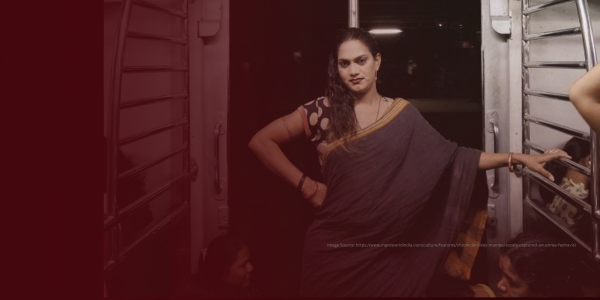We live comfortably in our privileges until the very moment we are forced to open our eyes and start questioning them. Being born into an upper-caste Hindu family with the privilege of education, sound finances, and a supportive upbringing, I lived my life silently under its shadows when everything I knew about it had to be left behind one day.
Thereafter, I identified with the typical Mumbai hustler, travelling long hours on the train, learning more about life from the people I travelled with than I ever would from my college books. Regardless, I shared a love-hate relationship with Mumbaikars & the city itself. I often found myself standing on the platform, between the ladies and the general compartment, questioning where, as a gender-fluid person, I would feel safe to step in.
I came up with the solution to travel in the ‘first class’ compartment, thinking people there wouldn't care and I wouldn't have to answer their questions about whether I was a boy or a girl. These ubiquitous questions often make queer people feel ostracised for wanting to express themselves in ways different from the norm. While, for some time, it did become a safe space for me as a person who ‘looked’ like I belonged there, I am often reminded of the day I started feeling otherwise.
It felt like a regular day. I was completely engrossed in reading a book with just one other person in the first class ladies' compartment, separated from the second class by a couple of metallic rods. As I sat facing the division, still seeing people on the other side, I thought, ‘Maybe these mere rods are the only thing that separate us. All of us are together as we sync with the heartbeat of Mumbai - it's running local railways’.
The book I was reading might have been ‘Shikhandi’ by Devdatt Patnaik, which presents a plethora of queer representations in Hindu mythology. It always made me wonder why queerness is generally believed to be separated from religion today. Isn’t the first spiritual step to be compassionate towards fellow creations of god, whatever they might look like?
Just then, one of my friends, Shakti, who identifies as a hijra woman, got into the same compartment. I didn't have to think twice about going up to her and having a pleasant conversation about the mundane things happening in our lives. The best part was that I never had to put on any filter to talk to her. I knew she wouldn't judge me for the properness of my language, attire, or even which religion or caste I belonged to. She had seen enough discrimination to know that these superficial things did not define the kind of person someone is. Additionally, Shakti had this glimmer to her, not just because of her shimmery saree but because she knew who she was and had accepted it beautifully.
Little did I know that as we shared this beautiful moment of friendship, the other person in the compartment was feeling unbearably uncomfortable with Shakti’s presence. (I use gender-neutral references for the other person as I don't want to assume their gender as per my norms of gender identity). Out of nowhere, they snapped at us, saying, “idhar hijre nahi chad sakte” (Hijra people cannot enter here), to which I naturally responded, “Inko 2 - 3 station ke bad hi utarna hai” (They just have to get down after 2 -3 stations). These accusations sounded familiar and normal for a queer person who faces a discriminatory society every day until they asked me, “kya tum bhi hijra ho?” (Are you also hijra?) I was taken aback by this question, not because they thought I was hijra but because they used it as a slur. I rebelled about how it was okay to be hijra, and if I was that, it was absolutely fine. While I argued with this person, Shakti maintained her composure. To me, it was frustrating as well as shocking to see her so calm in such a triggering situation. They went on to talk about how god had created hijra people different from “normal” people and that the community chose a sinful lifestyle.
At this point, the accusations and the arguments they put forward had numbed my heart and mind. I was having a hardcore reality check of society, and for my young mind, it was too much too soon. After being zoned out for a bit, I was brought back to the present when they tried subtly pushing Shakti out of the compartment as the train approached the station. The best thing I could think of for my safety was to get down with her.
As Shakti and I stood facing each other, my surroundings had somehow acquired a sombre and silent tone. She was kind enough to break the silence and say, “Hota hai ye” (This happens). “Hamesha?” (Always?) I asked. To which she said something which broke my shell of privileges open once and for all. She said, “Jab Gents compartment mai jati hun to wo gandi nazar se dekhte hai. Ladies mai jaun toh unko lagta hai ki mai unki jaisi nahi hun, ek aurat nahi hun. Toh socha, first class mai jati hun, educated log hote hai… samjhenge” (When I get into the Gents' compartment, they leer at me. When I enter the Ladies' compartment, they think I am not a woman like them. So I thought if I got into the first class compartment of educated people, they would understand).
These words rang a painful bell for me to realise that many of us are part of the same system, which keeps on marginalising people based on their identities. Education guarantees nothing, and neither do policies that ‘protect’ people unless we enable a revolution to be humanitarians. From education to policies to basic infrastructure, the system is inefficient, unsafe, and discriminatory for people of colour, disabilities, and other diverse identities.
For Shakti, it was just another day of harassment at what she called her workspace. In the book ‘Shikhandi’ and in our Indian scriptures, we often read about transgender, intersex, and homosexual characters, which shows queer people’s immense contributions to these works. For example, Ardhnareshwar, Aranavi or even Shikhandi themselves. So why do we find it difficult to surround ourselves with people who identify differently from us? One common argument about the hijra community is, ‘Wo kaam kyu nahi karte?’ (Why don’t they work and earn?) I wonder if Shakti wasn't allowed to peacefully travel in what is called ‘public transport’, would she be permitted at a workplace? Would she feel safe?
It's not wrong to have privileges but what matters is what we do with them. When we look at ourselves in the mirror at the end of the day, we look at a human being undergoing human experiences of love, pain, disappointments, and happiness. Emotions that all of us on this planet experience. We are so much more than the labels of ‘classes’, ‘identities’ and the sense of superiority that comes with privileges. Maybe it's just an illusion, like the metallic rods in between compartments that separate us. At the end of the day, we are on the same train of life!
Be love. Be light.
Author: Mx Rumi Sharma Editor: Sumali Nagarajan
DISCLAIMER – No information contained in this website may be reproduced, transmitted, or copied (other than for the purposes of fair dealing, as defined in the Copyright Act, 1957) without the express written permission of Rainmaker Online Training Solutions Pvt. Ltd.










